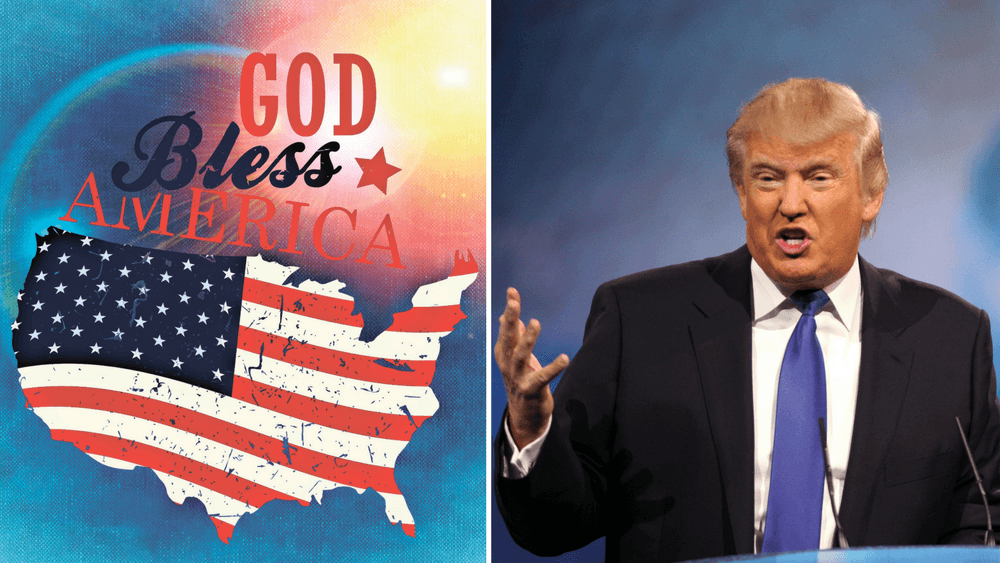Apocalypse now: the rise of Trump
November 9, 2016, started on an apocalyptic note: Donald J. Trump, the Republican Party frontrunner, had won his unlikely bid to become the 45th President of the United States. It was an outcome that virtually no media analyst or poll predicted.
In Australia, November 9, 2016, started as it does many other days. Newscasters covered cricket scores and the finale of reality home-renovation show The Block. But for much of America, November 9 started on an apocalyptic note: Donald J. Trump, the Republican Party frontrunner, had won his unlikely bid to become the 45th President of the United States.

Katelyn Beaty Katelyn Beaty
It was an outcome that virtually no media analyst or poll predicted.
Hillary Clinton, the Democratic Party candidate, had decades of political experience and outshone Trump in televised debates. Certainly, she did come under fire for her misuse of email servers and her close ties to big corporations. Still, her defeat by a brash businessman who bragged about sexual assault, mocked the disabled and fumbled over basic policy questions, pointed to an ominously unpredictable future.
Without a doubt, the social issue that has most animated white evangelicals for the past 40 years is legalised abortion.
The 2016 election also revealed complex divides among US evangelical Christians. About 25 per cent of Americans identify as evangelical. They represent Baptist, Presbyterian, Lutheran, Anglican, Pentecostal and nondenominational churches, among others. For the past 40 years, white evangelicals have strongly supported Republican candidates, typically for their stances on abortion, traditional marriage and religious liberty. Clinton campaigned on an overt pro-choice platform and did little to connect with Christians. On one level, evangelical support for Trump seemed a shoe-in.
Yet their support for Trump – at 81 per cent of all voting white evangelicals – still surprised in its uniformity. It also revealed deep fissures in the American church. At least three of those fissures have and will continue to shape the future of evangelicalism in the United States and beyond.
Trump’s strong win among evangelicals signals a deep problem of discipleship and moral formation at the local church level.
The first divide revealed by Trump’s win is between evangelical leaders and everyday, “rank-and-file” believers. Several evangelical leaders and institutions denounced Trump for his multiple affairs, his obession with money and his derogatory comments against racial minorities, women and Muslims. Christianity Today magazine (where I served as an editor for nine years) called Trump “the very embodiment of what the Bible calls a fool.” Russell Moore and Al Mohler, two Southern Baptist heavyweights, opposed Trump, breaking from their conservative southern base.
That 81 per cent of white, voting evangelicals still supported Trump suggests many are more swayed in their politics by talk radio and 24-hour news channels than by church leaders and discipleship. The moral imagination of many evangelicals is shaped more by far-right conservative soundbites than by church leadership and the full witness of Scripture. Erick Erickson, a conservative evangelical who denounced Trump, said: “The more a Christian goes to church, the more that Christian is likely to oppose Donald Trump.” Trump’s strong win among evangelicals signals a deep problem of discipleship and moral formation at the local church level.
White evangelicals’ support of Trump likely undid decades of hard-won reconciliation between white and black churches.
The second divide Trump’s win revealed is between white evangelicals and Christian leaders of color. In the months before the election, black Christian leaders who hold the same convictions as many white evangelicals sounded the alarm on what a Trump win would mean for their communities. Thabiti Anyabwile wrote at The Gospel Coalition about the serious problems of a Trump win. After the election, many Christian leaders of color mourned that their white co-religionists seemed to ignore their concerns. Ekemini Uwan tweeted on November 8: “#ElectionNight taught me that white evangelicals will NOT be denied their privilege. They will trample the cross to hold onto it.” White evangelicals’ support of Trump likely undid decades of hard-won reconciliation between white and black churches.
The third divide Trump’s win revealed is between single-issue evangelicals and those who vote with a broad social ethic. Without a doubt, the social issue that has most animated white evangelicals for the past 40 years is legalised abortion.
Trump had promised to be pro-life on the issue of abortion, but his policies and approach on other issues seem decidedly “anti-life.”
This election, evangelicals faced a very difficult choice, between a morally bankrupt candidate who nonetheless promised to nominate a pro-life Supreme Court justice, and a generally competent candidate who ran on an unabashed pro-choice platform. Thus, many white evangelicals held their noses to vote for Trump, not liking him but seeing no other way to vote pro-life.
Yet other evangelicals tried to practise a social ethic that includes the unborn but also extends to other vulnerable people, such as refugees, ethnic minorities, and the sick and dying. Trump had promised to be pro-life on the issue of abortion, but his policies and approach on other issues seem decidedly “anti-life.” Moving forward, evangelicals will need to find ways to articulate a social ethic that transcends party politics to protect life from womb to tomb.
Trump is already dividing the United States, turning family member against family member, citizen against citizen. But by grace, he won’t and can’t divide the united church of Christ.
November 9 started out apocalyptic, but it ended with a bit of hope. The day had already seen a rash of spraypainted swastikas and racist ephitets cropping up. Christian leaders of color were in mourning. But my mum reminded me of an eternal truth: No political leader can deliver the kingdom of God. The American experiment is quite small in the scheme of history and, one day, people from every tribe, tongue and nation will proclaim Jesus as Lord.
Perhaps now more than ever, US evangelicals must look to our brothers and sisters the world over, including those in Australia, to reclaim their prophetic edge. How are other believers thriving amid political rancour and even persecution? How do we thoughtfully engage politics now while living with hopeful expectancy of the kingdom of God? Trump is already dividing the United States, turning family member against family member, citizen against citizen. But by grace, he won’t and can’t divide the united church of Christ.
Katelyn Beaty is a former editor at large at Christianity Today, and is author of A Woman’s Place: A Christian Vision for Your Calling in the Office, the Home, and the World (Simon & Schuster). She tweets at @KatelynBeaty.

